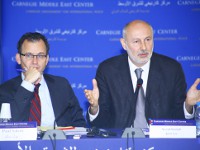{
"authors": [
"Yezid Sayigh"
],
"type": "event",
"centerAffiliationAll": "",
"centers": [
"Carnegie Endowment for International Peace",
"Malcolm H. Kerr Carnegie Middle East Center"
],
"collections": [],
"englishNewsletterAll": "",
"nonEnglishNewsletterAll": "",
"primaryCenter": "Carnegie Endowment for International Peace",
"programAffiliation": "",
"programs": [],
"projects": [],
"regions": [
"Levant"
],
"topics": [
"Political Reform",
"Security"
]
}
Event
Authoritarian and Security Trends in the West Bank and Gaza
Thu, April 7th, 2011
Beirut
In an era when social mobilization has empowered citizens and rocked the foundations of Arab dictatorships, the Palestinian governments are moving toward a more authoritarian model of governance. Although they lack a strong centralized state that practices complete sovereignty over its territory, their unprecedented policing of Palestinians in both Gaza and the West Bank has led to security apparatuses that are left largely unchallenged and report to command structures that are lacking in constitutional legitimacy.
Yezid Sayigh, professor of political science at King’s College London, discussed possible implications of the authoritarian build-up in the Palestinian arena.
The Rise of Authoritarianism
Sayigh traced how authoritarianism has increased in Palestine, despite the anti-authoritarian movements in the region that have brought down other leaders.
- Advent of authoritarianism: Due to the absence of convincing prospects for national state-building and independence, the governments of Gaza and the West Bank have relied more heavily on policing methods to govern their respective societies. Policing reflects the image of statehood through the preservation of societal peace, Sayigh explained.
- The Arab Spring: The Arab Spring that has flourished throughout the Arab world was met with a modest reaction in the Palestinian territories. When politically independent protestors took to the streets in Gaza in solidarity with the anti-regime protestors of Egypt, the police quickly attempted to curb the protest. Hamas values its strategic relationship with Egypt, which represents Gaza’s chief connection to the outside world, Sayigh explained. The West Bank police also violently dispersed a pro-Egyptian democracy demonstration in Ramallah.
- Security in the West Bank and Gaza: Efforts to prevent protests in both regions led their governments even closer to resembling authoritarian Arab states in their day-to-day security affairs. Their quick movement to put police on the street helped them absorb the shocks to the political system that were caused by the independent protests in the West-Bank and Gaza.
- An official Palestinian state: The declaration of a Palestinian state by September 2011 or the full legal international recognition of Palestine’s status may bring about no tangible changes in its governance, Sayigh warned. If the recognition does not provide the Palestinians with greater ability to exert sovereign control than what already exists, the Palestinian people will be disillusioned by the entire process, he predicted. As a consequence, the gaps will widen between the governments of Gaza and the West Bank over their conceptions of proper governance. By extension, the political stalemate would plunge Fatah into an unenviable political situation and place Hamas in a risky position; leaving both parties trapped in the framework of a state that lacks real sovereign capacities.
Approaches to Security in Palestine
In the West Bank, the liberal vision of governance prevails. In theory, the police forces abide by the rules of the judiciary and its respective institutions. In reality, however, the terms of constitutional institutions have lapsed since 2007 and no legal sovereignty exists. Therefore, Fatah, as the leading political organization, has greater influence over the security forces than the respective governmental authorities.
In the Gaza Strip, there is frequent verbal confirmation of adherence to the existing laws of the Palestinian Authority, which are largely secular, and of respect for human rights. However, the government utilizes the police to enforce the Islamization of society. The security forces reflect the conservative traditions of society and, in particular, the Hamas-led government.
Conclusion
Sayigh concluded that authoritarianism is increasing in both the Gaza Strip and the West Bank. Both governments cannot move from control over one region to participation in each other’s systems, not least because Israel will oppose full reintegration of the two governments and police forces of the two regions if it involves a role for Hamas. The authoritarian inclination at the moment will continue, he said; the police are going to manage the streets. Furthermore, the emergence of the security sector as an authority in its own right that is not wholly under the command and control of political leaders is an interesting development and unique in the history of Palestine, Sayigh said.
Carnegie does not take institutional positions on public policy issues; the views represented herein are those of the author(s) and do not necessarily reflect the views of Carnegie, its staff, or its trustees.
Event Speaker
Yezid Sayigh
Senior Fellow, Malcolm H. Kerr Carnegie Middle East Center
Yezid Sayigh is a senior fellow at the Malcolm H. Kerr Carnegie Middle East Center in Beirut, where he leads the program on Civil-Military Relations in Arab States (CMRAS). His work focuses on the comparative political and economic roles of Arab armed forces, the impact of war on states and societies, the politics of postconflict reconstruction and security sector transformation in Arab transitions, and authoritarian resurgence.
